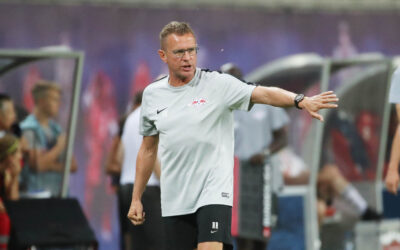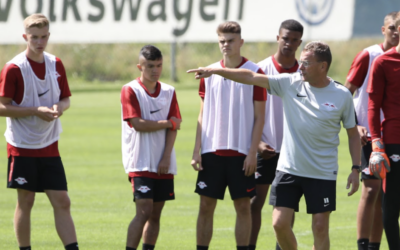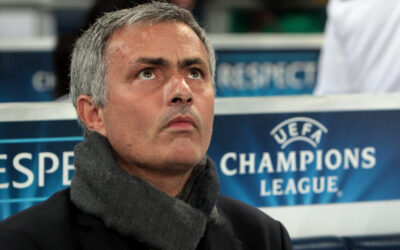Olli Kahn has gone into hiding, on holiday in Sardinia, recovering. How does a flawless player cope with a mistake – and then with one like the one he made on Sunday in the World Cup final in Yokohama?
When Oliver Kahn squatted on the ground after the World Cup final and leaned against the goal post with his back extended, looking for support, done with himself, God and the world, it was an advantage that no one handed him a gun – he would have gratefully given himself the bullet.
What was going on inside him?
To have a rough idea, you only need to know what father Rolf once reported from his Olli’s childhood: “When the boy lost at Mensch-ärgere-dich-nicht, the pieces flew around my ears.”
It must have been something like that, only much more terrible, when the best goalkeeper in the world lost the World Cup final in Yokohama last Sunday. Instead of the Olli-annoy-you figures, this time he peppered away his gloves, and for the rest he would have gone mad on the spot if, because it is the incurable professional disease of all goalkeepers, he hadn’t been before. A goalkeeper has to be crazy, otherwise he perishes on the fine line between hero and fool.
Early on in the 1990s, when he was in his early 20s, Kahn explained his job description to me. At that time, he was a promising talent in the goalkeeper’s box at Karlsruher SC and had not yet experienced much, but he already knew perfectly well what kind of professional challenge he had saddled himself with: “As a goalkeeper, you are a lone fighter,” he said, “a field player can clean up his mistakes, but the goalkeeper cannot. Life in goal makes you lonely.” Especially a mistake like that.
It was his only one in the whole World Cup.
What a great, unsurpassable, overwhelming tournament he had played, friend and foe had celebrated and feared him as “King Kahn” or “Titan”. Without the hotshot in goal, Rudi Völler’s DFB team would not have made it to the final, but would have flown home quickly after the preliminary round on sneaky routes, economy, wooden class, and probably been greeted at Frankfurt airport with a hail of tropical fruit and rotten tomatoes. But for three reasons the team ended up in the final instead, namely “with struggle, cramp and Kahn”, as TV reporter Marcel Reif truthfully reported. The best goalkeeper in the world was also voted the best player of the World Cup before kick-off. And then this: he loses this final match, the all-important one, the most important of his career.
“It will torment me for a few days,” he says in the dark night after the mishap.
A few days? All his life it will haunt him, for the world is mean. “The only people who remember you when you come second are your wife and your dog,” said the Briton Damon Hill when he once again couldn’t get past Michael Schumacher in Formula 1. Whereas Kahn is now trying to get rid of the ghosts not with his wife and dog, but with his wife and child. He has allegedly fled to Sardinia, on holiday or in therapy.
At this moment he is probably standing in front of the mirror in his hotel room, berating himself, or biting his cheek, as he occasionally does with opponents in the Bundesliga, with his chin thrust out to the hilt and a grimace of self-contempt. For only a flawless and number one is good enough for someone like Kahn, as it was in his early years at KSC, when rivals Famulla and Wimmer disputed his place in goal – poor Famulla, Rudi Wimmer remembers, never lay down in a room with Kahn in the hotel for safety’s sake, “for fear that he would press the pillow on his face at night.”
Olli’s wife doesn’t have to be afraid of that now, but she has to be prepared for everything else. Does he lash out in his sleep? Does he rattle off Rivaldo’s shot again in his nightmares? Does he talk to himself in a gruelling manner? Does he pound his fists against the bedside drawer? How does Kahn deal with this low point in his career, which he suspects there will be no lower? How does he deal with the pity and the knowledge that he has squandered the myth of invincibility? As he squatted down there in the grass, conquered, defeated and inwardly buried, Sat 1 reporter Werner Hansch said: “He comes closer to me at this moment. He is among us again – as a human being.”
For Kahn, this is no consolation. The alien against the rest of the world, you can get used to such headlines as a goalkeeper. “The stone-faced man is a giant,” a Dallas paper had marvelled at him after the US youngster Landon Donovan froze free in front of Kahn like a rabbit in front of a snake – the scene coincided with the blueprint transferred to real life of that TV commercial in which a penalty taker, seeing Kahn in front of him, turns and flees in mid-attack. So at some point, as a goalkeeper, you become a knight in steel armour against whom everything bounces off, year after year Kahn has become more and more worthy of this image, until last week he hovered completely above everything, “Bild” made it short: “The fist of God.”
At most, the Almighty still lived on the floor above Olli – but he obviously got fed up with the magic and set the celestial hierarchy right again with the shock of Yokohama.
How does the fallen giant now find inner peace again in Sardinia? No one knows, but it at least feels reassuring to hear that he allegedly likes to listen to Vivaldi and Tchaikovsky to relax and, in emergencies, also relies on the book “Mental Strength” by James E. Loehr. So there is much to suggest that Kahn will soon be spitting in his gloves again and that the world’s greatest gunners should start thinking about how best to take cover from him.
The German Chancellor has also intervened in the meantime and declared the return of the national goalkeeper to his old strength a top priority, so to speak. “Olli Kahn is not smaller after this mistake, that’s nonsense,” Gerhard Schröder has reassured the beleaguered nation, and flanking this we have heard a TV prophet on Sat 1 say: “A Kahn is coming back, stronger than ever.”
Even stronger? God help him.




